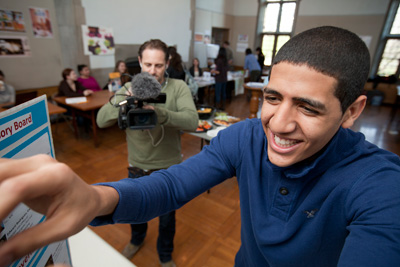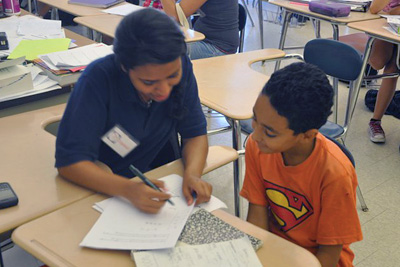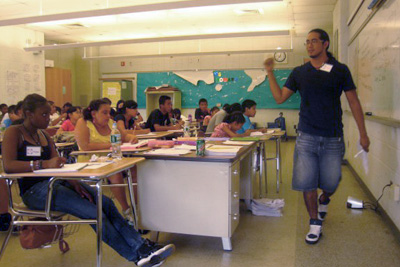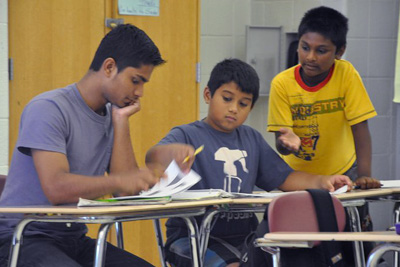To give back, students launch nonprofit mentoring organization
By Kathy Hovis




When Karim Abouelnaga '13 was 15 in 2007, his father, an Egyptian immigrant, died, leaving the family with nothing, and the store his parents operated in Manhattan went under.
"I always thought one day I would run the family business," said Abouelnaga, a hotel administration major. "But after my father's death, the only thing left for me was my education." So he focused on doing well in high school -- spurred on by a program called REACH that offered financial incentives and extra support to students from his low-income school who agreed to take advanced placement courses.
Making the most of his education, Abouelnaga transferred from Baruch Honors College to Cornell. Now, he and Amy Mitchell '13, Andre Perez '13, Nicolas Savvides '14 and Brennan Spreitzer '13 are trying to bring the benefits of higher education to more young people through Practice Makes Perfect, a nonprofit startup they founded this summer that is also a Cornell student organization.
Over the summer, Practice Makes Perfect paired 32 struggling fifth-graders at a Long Island City elementary school with 16 ambitious high school mentors in the same district for an eight-week tutoring/mentoring program on basic math and English Language Arts (ELA) skills. They worked under the guidance of 10 college interns, who taught classes and kept track of student progress.
"The high school students were very capable teachers, and the younger kids could see that the high school kids had overcome the same adversities that they were facing," Abouelnaga said. "They became like big brothers and sisters, walking them home, doing crafts."
The partnerships paid off. By summer's end, students scored on average 6 percent higher in math and 4 percent higher on ELA tests.
"After the third week, we began to see a spark of energy and competitiveness when it came to performing well in school," said Savvides, a founder and third-year architecture major at Cornell who served as program administrator for Practice Makes Perfect. "We wanted to excite these kids about learning and create a community. I think we did it."
The high school students earned a $400 salary for summer work and committed to taking AP classes to help them prepare for college. The founders also hosted a college exploration event for them during the summer, bringing in 24 college students from 15 universities.
Plans now include expanding the program to three new sites next summer, while offering previous participants another summer of growth and achievement; launching a for-profit business to support the nonprofit; and applying for grants and competitions and seeking more donors. Its first year was supported by Entrepreneurship@Cornell, the Cornell Public Service Center and various individuals.
"One intriguing factor that attracted me to this project was the notion that these kids, as juniors at Cornell, would realize the importance of giving back," said Linda Gadsby '88 of Scholastic Inc. in New York City and an advisory board member for Practice Makes Perfect; she is helping the organization to incorporate. "The fact that the [high school] students are from the same neighborhood as the fifth-graders they are tutoring is an important aspect of the program. It means that they have similar life experiences, and therefore the younger kids can relate to them," Gadsby said. "That takes away a lot of anxiety the kids may have and, paired with the one-on-one instruction, allows them to be successful."
Kathy Hovis is a writer/editor for Entrepreneurship@Cornell.
Media Contact
Get Cornell news delivered right to your inbox.
Subscribe